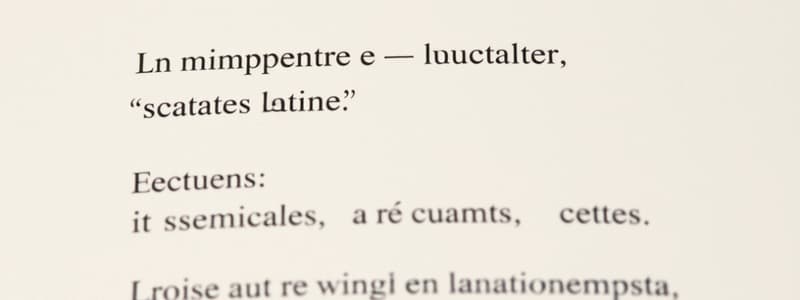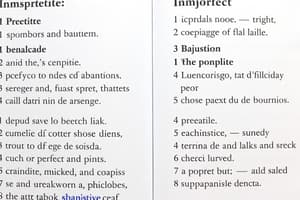Podcast
Questions and Answers
What is the correct ending for the 'Nosotros/as' form in the imperfect subjunctive?
What is the correct ending for the 'Nosotros/as' form in the imperfect subjunctive?
- -rai
- -ras
- -ran
- -ramos (correct)
Which of the following forms would be used to create the 'Tú' form in the imperfect subjunctive?
Which of the following forms would be used to create the 'Tú' form in the imperfect subjunctive?
- Add -rais to the infinitive form
- Drop -ron and add -ran
- Drop -ron and add -ra
- Drop -ron and add -ras (correct)
What is the base form used before adding the imperfect subjunctive endings?
What is the base form used before adding the imperfect subjunctive endings?
- The 3rd person plural form in preterite (correct)
- 3.1
- 2.1
- The 1st person plural form
What is the ending for 'Ellos/Ellas/Ustedes' in the imperfect subjunctive?
What is the ending for 'Ellos/Ellas/Ustedes' in the imperfect subjunctive?
Which of the following combinations correctly describes how to form the imperfect subjunctive?
Which of the following combinations correctly describes how to form the imperfect subjunctive?
What is the correct form for 'Tú' when using the verb 'Vender' in the imperfect subjunctive?
What is the correct form for 'Tú' when using the verb 'Vender' in the imperfect subjunctive?
Which of the following forms corresponds to 'Nosotros/as' for the verb 'Escribir' in the imperfect subjunctive?
Which of the following forms corresponds to 'Nosotros/as' for the verb 'Escribir' in the imperfect subjunctive?
Identify the correct form for 'Ellos/Ellas/Ustedes' with the verb 'Hablar' in the imperfect subjunctive.
Identify the correct form for 'Ellos/Ellas/Ustedes' with the verb 'Hablar' in the imperfect subjunctive.
Which conjugated form represents 'Yo' in the imperfect subjunctive for the verb 'Vender'?
Which conjugated form represents 'Yo' in the imperfect subjunctive for the verb 'Vender'?
What is the form of the verb 'Escribir' for 'Vosotros/as' in the imperfect subjunctive?
What is the form of the verb 'Escribir' for 'Vosotros/as' in the imperfect subjunctive?
What is the imperfect subjunctive form of the verb 'poder' for the 1st person?
What is the imperfect subjunctive form of the verb 'poder' for the 1st person?
Which of the following verbs has the form 'trajera' in the imperfect subjunctive for the 1st person?
Which of the following verbs has the form 'trajera' in the imperfect subjunctive for the 1st person?
Which imperfect subjunctive form corresponds to the verb 'saber' for the 1st person?
Which imperfect subjunctive form corresponds to the verb 'saber' for the 1st person?
Identify the imperfect subjunctive form of 'ser' for the 3rd person plural.
Identify the imperfect subjunctive form of 'ser' for the 3rd person plural.
Which of the following forms is used for 'tú' with the verb 'querer' in the imperfect subjunctive?
Which of the following forms is used for 'tú' with the verb 'querer' in the imperfect subjunctive?
In which situation would the subjunctive present be correctly used?
In which situation would the subjunctive present be correctly used?
Which phrase correctly expresses a hope or desire using the subjunctive?
Which phrase correctly expresses a hope or desire using the subjunctive?
What is the correct context for using the present subjunctive with emotional reactions?
What is the correct context for using the present subjunctive with emotional reactions?
Which sentence illustrates the correct use of the future conjunction in the subjunctive?
Which sentence illustrates the correct use of the future conjunction in the subjunctive?
Which option correctly indicates a possibility using the subjunctive?
Which option correctly indicates a possibility using the subjunctive?
Flashcards are hidden until you start studying
Study Notes
Formation of the Imperfect Subjunctive
- The imperfect subjunctive in Spanish is formed using the third person plural form of the preterite tense.
- For regular verbs:
- "Hablar" (to speak) → "Hablaron" (they spoke)
- "Vender" (to sell) → "Vendieron" (they sold)
- "Escribir" (to write) → "Escribieron" (they wrote)
- After identifying the third person plural, remove the "-ron" ending to derive the stem for conjugation.
Endings for Conjugation
- The following endings are added to the stem for each pronoun:
- Yo: -ra
- Tú: -ras
- Él/Ella/Usted: -ra
- Nosotros/as: -ramos
- Vosotros/as: -raiss
- Ellos/Ellas/Ustedes: -ran
Summary of Conjugation Process
- Identify the appropriate preterite tense form for the verb.
- Drop the "-ron" ending from the third person plural.
- Add the specific endings corresponding to the subject pronouns to form the imperfect subjunctive.
Verb Conjugations in Spanish (Imperfect Subjunctive)
Hablar (to speak)
- Yo: Hablara
- Tú: Hablaras
- Él/Ella/Usted: Hablara
- Nosotros/as: Habláramos
- Vosotros/as: Hablarais
- Ellos/Ellas/Ustedes: Hablaran
Vender (to sell)
- Yo: Vendiera
- Tú: Vendieras
- Él/Ella/Usted: Vendiera
- Nosotros/as: Vendiéramos
- Vosotros/as: Vendierais
- Ellos/Ellas/Ustedes: Vendieran
Escribir (to write)
- Yo: Escribiera
- Tú: Escribieras
- Él/Ella/Usted: Escribiera
- Nosotros/as: Escribiéramos
- Vosotros/as: Escribierais
- Ellos/Ellas/Ustedes: Escribieran
Key Features of the Imperfect Subjunctive
- Used to express wishes, hypotheticals, and situations contrary to fact.
- Often used in conditional sentences that refer to past actions.
- The endings for all three verbs follow a similar pattern, illustrating regularity in conjugation.
Imperfect Subjunctive Forms of Irregular Verbs
- The imperfect subjunctive is used in Spanish to express wishes, hypotheticals, and actions that are contingent on another action.
- Irregular verbs in the imperfect subjunctive form must be memorized due to their unique alterations from standard patterns.
Key Irregular Verbs and Their Forms
-
Poder (to be able)
- 6th person preterite: pudieron
- 1st person imperfect subjunctive: pudiera
-
Poner (to put)
- 6th person preterite: pusieron
- 1st person imperfect subjunctive: pusiera
-
Querer (to want)
- 6th person preterite: quisieron
- 1st person imperfect subjunctive: quisiera
-
Saber (to know)
- 6th person preterite: supieron
- 1st person imperfect subjunctive: supiera
-
Ser (to be)
- 6th person preterite: fueron
- 1st person imperfect subjunctive: fuera
-
Tener (to have)
- 6th person preterite: tuvieron
- 1st person imperfect subjunctive: tuviera
-
Traer (to bring)
- 6th person preterite: trajeron
- 1st person imperfect subjunctive: trajera
-
Venir (to come)
- 6th person preterite: vinieron
- 1st person imperfect subjunctive: viniera
Subjunctive Uses in the Present
-
Influencing Others: Used when trying to persuade or urge someone to take action. Example: "Insisto que hagas esto ahora" (I insist that you do this now).
-
Emotional Reactions: Expresses feelings about a situation or other people's actions. Example: "Me alegro que estés aquí" (I’m glad that you are here).
-
Doubt / Disbelief: Conveys skepticism about a statement or situation. Example: "Dudo que exista Dios" (I doubt that God exists).
-
Expressions of Possibility: Indicates situations that may occur under certain conditions. Example: "Es posible que venga mi primo" (It’s possible that my cousin will come).
-
Conjunctions of Futurity: Used with phrases that refer to future events or conditions. Example: "Hasta que se cambie la ley…" (Until the law is changed…).
-
Hoping / Wanting: Expresses wishes or desires regarding future outcomes. Example: "Espero que me llame mi novio" (I hope my boyfriend calls me).
Studying That Suits You
Use AI to generate personalized quizzes and flashcards to suit your learning preferences.




